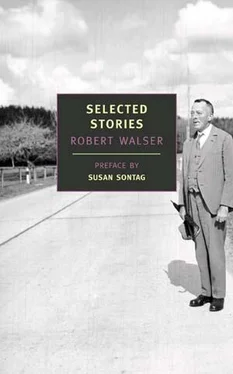Robert Walser
Selected Stories
ROBERT WALSER is one of the important German-language writers of this century — a major writer, both for his four novels that have survived (my favorite is the third, written in 1908, Jakob von Gunten ) and for his short prose, where the musicality and free fall of his writing are less impeded by plot. This selection of Walser’s short prose was made (and mostly translated) by the admirable Christopher Middleton, who has labored for years to make Walser known to English-language readers, and draws from work done between 1907 and 1929.
Anyone seeking to bring Walser to a public that has yet to discover him has at hand a whole arsenal of glorious comparisons. A Paul Klee in prose — as delicate, as sly, as haunted. A cross between Stevie Smith and Beckett: a good-humored, sweet Beckett. And, as literature’s present inevitably remakes its past, so we cannot help but see Walser as the missing link between Kleist and Kafka, who admired him greatly. (At the time, it was more likely to be Kafka who was seen through the prism of Walser. Robert Musil, another admirer among Walser’s contemporaries, when he first read Kafka pronounced the latter “a peculiar case of the Walser type.”) I get a similar rush of pleasure from Walser’s single-voiced short prose as I do from Leopardi’s dialogues and playlets, that great writer’s triumphant short prose form. And the variety of mental weather in Walser’s stories and sketches, their elegance and their unpredictable lengths remind me of the free, first-person forms that abound in classical Japanese literature: pillow book, poetic diary, “essays in idleness.” But any true lover of Walser will want to disregard the net of comparisons that one can throw over his work.
In long as in short prose Walser is a miniaturist, promulgating the claims of the anti-heroic, the limited, the humble, the small — as if in response to his acute feeling for the interminable. Walser’s life illustrates the restlessness of one kind of depressive temperament: he had the depressive’s fascination with stasis, and with the way time distends, is consumed; and spent much of his life obsessively turning time into space: his walks. His work plays with the depressive’s appalled vision of endlessness: it is all voice — musing, conversing, rambling, running on. The important is redeemed as a species of the unimportant, wisdom as a kind of shy, valiant loquacity.
The moral core of Walser’s art is the refusal of power; of domination. I’m ordinary — that is, nobody — declares the characteristic Walser persona. In “Flower Days” (1911), Walser evokes the race of “odd people, who lack character,” who don’t want to do anything. The recurrent “I” of Walser’s prose is the opposite of the egotist’s: it is that of someone “drowning in obedience.” One knows about the repugnance Walser felt for success — the prodigious spread of failure that was his life. In “Kienast” (1917), Walser describes “a man who wanted nothing to do with anything.” This non-doer was, of course, a proud, stupendously productive writer, who secreted work, much of it written in his astonishing micro-script, without pause. What Walser says about inaction, renunciation of effort, effortlessness, is a program, an anti-romantic one, of the artist’s activity. In “A Little Ramble” (1914), he observes: “We don’t need to see anything out of the ordinary. We already see so much.”
Walser often writes, from the point of view of a casualty, of the romantic visionary imagination. “Kleist in Thun” (1913), both self-portrait and authoritative tour of the mental landscape of suicide-destined romantic genius, depicts the precipice on the edge of which Walser lived. The last paragraph, with its excruciating modulations, seals an account of mental ruin as grand as anything I know in literature. But most of his stories and sketches bring consciousness back from the brink. He is just having his “gentle and courteous bit of fun,” Walser can assure us, in “Nervous” (1916), speaking in the first person. “Grouches, grouches, one must have them, and one must have the courage to live with them. That’s the nicest way to live. Nobody should be afraid of his little bit of weirdness.” The longest of the stories, “The Walk” (1917), identifies walking with a lyrical mobility and detachment of temperament, with the “raptures of freedom”; darkness arrives only at the end. Walser’s art assumes depression and terror, in order (mostly) to accept it — ironize over it, lighten it. These are gleeful as well as rueful soliloquies about the relation to gravity, in both senses, physical and characterological, of that word: anti-gravity writing, in praise of movement and sloughing off, weightlessness; portraits of consciousness walking about in the world, enjoying its “morsel of life,” radiant with despair.
In Walser’s fictions one is (as in so much of modern art) always inside a head, but this universe — and this despair — is anything but solipsistic. It is charged with compassion: awareness of the creatureliness of life, of the fellowship of sadness. “What kind of people am I thinking of?” Walser’s voice asks in “A Sort of Speech” (1925). “Of me, of you, of all our theatrical little dominations, of the freedoms that are none, of the un-freedoms that are not taken seriously, of these destroyers who never pass up a chance for a joke, of the people who are desolate?” That question mark at the end of the answer is a typical Walser courtesy. Walser’s virtues are those of the most mature, most civilized art. He is a truly wonderful, heartbreaking writer.
Susan Sontag
I am a kind of artisan novelist. A writer of novellas I certainly am not. If I am well-disposed, that’s to say, feeling good, I tailor, cobble, weld, plane, knock, hammer, or nail together lines the content of which people understand at once. If you liked, you could call me a writer who goes to work with a lathe. My writing is wallpapering. One or two kindly people venture to think of me as a poet, which indulgence and manners allow me to concede. My prose pieces are, to my mind, nothing more nor less than parts of a long, plotless, realistic story. For me, the sketches I produce now and then are shortish or longish chapters of a novel. The novel I am constantly writing is always the same one, and it might be described as a variously sliced-up or torn-apart book of myself.
ROBERT WALSER, “Eine Art Erzählung,” 1928–29
YOU ask me if I have an idea for you, a sort of sketch that I might write, a spectacle, a dance, a pantomime, or anything else that you could use as an outline to follow. My idea is roughly the following: Get hold of some masks, half a dozen noses, foreheads, tufts of hair, and eyebrows, and twenty voices. If possible, go to a painter, who should also be a tailor, and have him make a series of costumes, and be sure to obtain a few good and solid pieces of scenery, so that, wearing a black overcoat, you can walk up some stairs or look out at a window, then utter a roar, a short, leonine, thick, heavy roar, to make people really believe that a soul is roaring, a human heart.
I ask you to attend to this cry, put elegance into it, make it sound pure and right, and then, as you like, you may reach up to one of your tufts of hair and lay it, doucement, on the ground. This, if done gracefully, will have a horrifying effect. People will think that pain has made you stupid. In order to obtain a tragic effect, you must employ the nearest as well as the remotest means; I say this so that you’ll now understand that it would be good, next, to put your finger into your nose and pick around with it vigorously. Some spectators will weep when they see this, such a noble, somber figure as yours, behaving so rudely and deplorably. It depends on what sort of face you make and from which angle the light shines on you. Be sure to dig your electrician in the ribs so that he’ll take the right amount of trouble, and above all coordinate your features, your gestures, your arms, legs, and mouth.
Читать дальше












